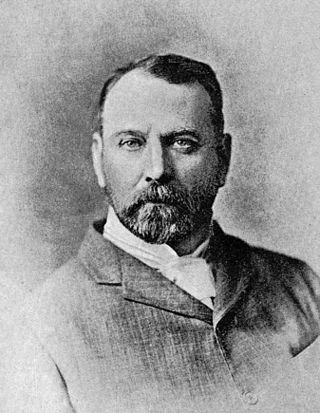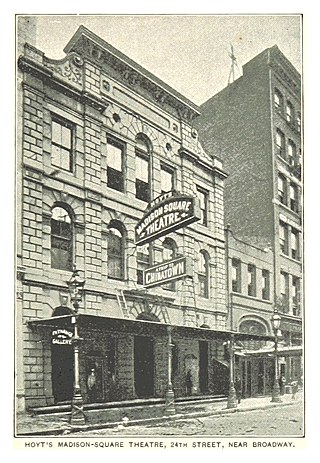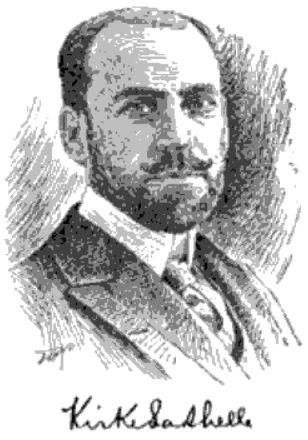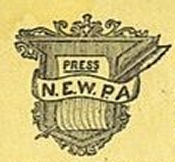
Paul Charles Joseph Bourget was a French poet, novelist and critic. He was nominated for the Nobel Prize in Literature five times.

Maurice Marie Émile Leblanc was a French novelist and writer of short stories, known primarily as the creator of the fictional gentleman thief and detective Arsène Lupin, often described as a French counterpart to Arthur Conan Doyle's creation Sherlock Holmes.

Arthur Reed Ropes, better known under the pseudonym Adrian Ross, was a prolific writer of lyrics, contributing songs to more than sixty British musical comedies in the late 19th and early 20th centuries. He was the most important lyricist of the British stage during a career that spanned five decades. At a time when few shows had long runs, nineteen of his West End shows ran for over 400 performances.

Sydney Grundy was an English dramatist. Most of his works were adaptations of European plays, and many became successful enough to tour throughout the English-speaking world. He is, however, perhaps best remembered today as the librettist of several comic operas, notably Haddon Hall.

Archibald Clavering Gunter was a British-American writer primarily known today for authoring the novel that the film A Florida Enchantment was based upon, and for his hand in popularizing "Casey at the Bat". He clipped the original publication of the poem from the San Francisco Examiner and passed it on to DeWolf Hopper, whose performances brought it fame.
The Garden Theatre was a major theater on Madison Avenue and 27th Street in Manhattan, New York City. The theatre opened on September 27, 1890, and closed in 1925. Part of the second Madison Square Garden complex, the theatre presented Broadway plays for two decades and then, as high-end theatres moved uptown to the Times Square area, became a facility for German and Yiddish theatre, motion pictures, lectures, and meetings of trade and political groups.

The Lyceum Theatre was a theatre in New York City located on Fourth Avenue between 23rd and 24th Streets in Manhattan. It was built in 1885 and operated until 1902, when it was torn down to make way for the Metropolitan Life Insurance Company Tower. It was replaced by a new Lyceum Theatre on 45th Street. For all but its first two seasons, the theatre was home to Daniel Frohman's Lyceum Theatre Stock Company, which presented many important plays and actors of the day.

The Madison Square Theatre was a Broadway theatre in Manhattan, on the south side of 24th Street between Sixth Avenue and Broadway. It was built in 1863, operated as a theater from 1865 to 1908, and demolished in 1908 to make way for an office building. The Madison Square Theatre was the scene of important developments in stage technology, theatre design, and theatrical tour management. For about half its history it had other names including the Fifth Avenue Theatre, Daly's Fifth Avenue Theatre, Hoyt's Madison Square Theatre, and Hoyt's Theatre.

Augustus J. "Gus" Heege was an American playwright and actor, whose works were popular at the end of the 19th century.

Trilby is a stage play by Paul M. Potter based on the 1894 novel Trilby by George du Maurier. In the play, a young Irish woman, Trilby O'Ferrall, falls under the control of Svengali, who uses hypnosis to make her abandon her fiancé and become a singer.

Kirke La Shelle was an American journalist, playwright and theatrical producer. He was known for his association with such successful productions as The Wizard of the Nile, The Princess Chic, Beside the Bonnie Brier Bush, Arizona, The Earl of Pawtucket, The Virginian, The Education of Mr. Pipp and The Heir to the Hoorah. La Shelle's career as a playwright and producer was relatively brief due to an illness that led to his demise at the age of forty-two.

Elinor Macartney Lane was an American novelist who was popular in the first decade of the 1900s. After publishing a number of short stories, she wrote three novels: Mills of God (1901), Nancy Stair (1904), and Katrine (1909).

Albert W. Fuller (1854-1934) was an American architect practicing in Albany, New York.

The New England Woman's Press Association (NEWPA) was founded by six Boston newspaper women in 1885 and incorporated in 1890. By the turn of the century it had over 150 members. NEWPA sought not only to bring female colleagues together and further their careers in a male-dominated field, but to use the power of the press for the good of society. The group raised funds for charity and supported women's suffrage and other political causes.

Maida Craigen was an American actress and clubwoman.

Mamie Gilroy was an American actress and singer in musical theatre.














